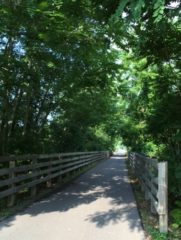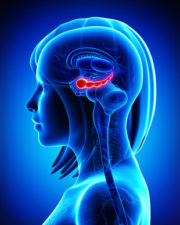
There is a beautiful 9-mile trail that runs between the town I live in and a nearby town. The trail is constructed from a former rail bed and is extremely popular with walkers, joggers, and bicyclists. It’s an idyllic place for an early morning walk, and I try to walk some portion of it several times a week. We all exercise for a variety of reasons: to get out and enjoy nature; to burn calories in order to lose weight; to spend social time with friends; to keep ourselves healthy. But now, as musicians, we have another reason to exercise – it actually improves memory.
And musicians are always concerned about memory – about whether or not it will hold up under the stress of performance, about what we can do to make memory for a piece of music more secure. Excessive concern about memory often leads to performance anxiety, and performance anxiety not only causes us to play less than our best, but can also lead to health problems, and in some cases, has derailed careers.
Over the past few months, I’ve given several talks (Illinois, Indiana, Pennsylvania, New Jersey, Maryland, Amsterdam) about learning and memory and how to memorize more securely to avoid performance anxiety. Later this month, I’ll be discussing the topic again at the 32nd World Conference of the International Society for Music Education in Glasgow.
In posts on this blog, I’ve written about practice strategies we can use that lead to more secure memory, including spaced practice, random practice, retrieval practice from long-term memory, using all learning styles, extremely slow practice, motor imagery, and sleep. Now let’s add exercise to that list.
A very recent study in the Netherlands demonstrated that physical exercise after learning improves memory and memory traces, but it must be done within a specific time frame – not just any time that you feel like it.
Seventy-two participants in the study learned 90 picture-location associations over a period of about 40 minutes. Remembering picture-location associations is declarative memory, just like remembering a piece of music. (See The many kinds of memory in music.)
After the study session, all of the participants were given a baseline recall test, and then randomly assigned to one of three groups: one group exercised immediately, one group exercised four hours later, and the third group did no exercise. The two exercise groups – the immediate and the 4 hours later – did 35 minutes of interval training on an exercise bike.
All of the groups did similarly well on the baseline recall test, so the study session had been effective for everyone. Forty-eight hours later, all of the participants did a second recall test – this time while their brains were being imaged in an MRI.
And surprise! The imaging results showed different patterns of activity in the three groups in a brain area called the hippocampus. The hippocampus (shown in red in the image) is instrumental in consolidating short-term into long-term memory. The group that showed the most activity in the hippocampus was the group that had exercised four hours after studying and that was also the group that had better recall of the information after 48 hours than the groups that had either exercised immediately or not at all.

Credit: pankajstock123/Fotolia.com
The researchers don’t know exactly why, but something about delayed exercise facilitated memory consolidation in the hippocampus.
Previous studies that had used procedural tasks (memory for how to play your instrument is procedural) showed that exercise close to the time of the activity maximized memory. Here a study involving declarative memory showed that exercise four hours later is more effective.
Researchers in this study admit to not knowing how sleep factors in since the retest was 48 hours later and obviously participants slept during that time. If you are a regular reader of this blog, you may recall that a study at the University of Texas that I wrote about in Just sleep on it showed that sleep improved motor skill learning (procedural memory) in students who had learned a piece of music in the evening and then went home to sleep.
Confused? It seems that – if you want to improve motor skills involved in playing your instrument (procedural memory), either sleep or exercise immediately after practice. If you want to remember the music itself – notes, rhythms, chords, structure, key relationships (declarative memory) – exercise 4 hours after practice.
The authors of this study caution that there are other avenues that could be pursued: 1) what about time intervals beyond the four hours that were tested? and 2) how does sleep factor in?
But even if there are more avenues to pursue, I find the research fascinating, and if you have the option, why not experiment with sleep and exercise and see how it affects your memory? You have nothing to lose, and even if exercise doesn’t help you memorize that Debussy Prelude, it may help you live longer.
2 responses to “Exercise and memory”
Hello Lois,
Thank you for a great article. I have long been aware of the benefits to memory of exercise, but not the relevance of specific time intervals. I exercise in the morning BEFORE I start my day’s routines including practicing the piano. Is there any work that speaks to this?
Thanks, Kwame. If there are any studies about exercise prior to practicing, I haven’t come across them. But if I do, I’ll be sure to post something about it.